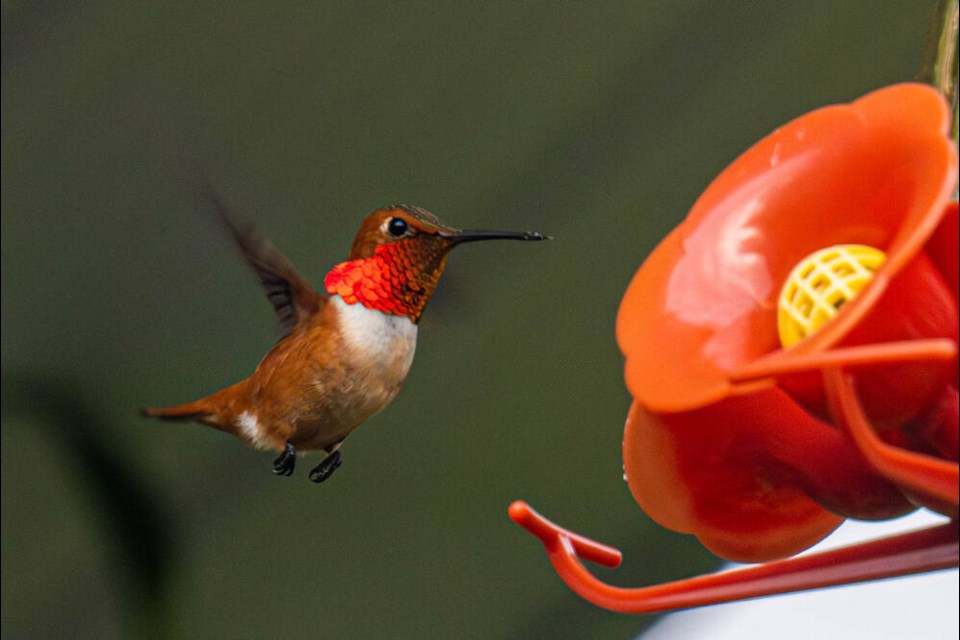A North Vancouver woman is urging backyard birdwatchers to keep their hummingbird feeders clean after recently coming across two hummingbirds that appeared to be showing telltale signs of fungal infection.
Anna Cho lives in an apartment on East 12th Street, near Lions Gate Hospital.
She usually has a hummingbird feeder out on her balcony to attract the Anna’s hummingbirds that are year-round residents in the Metro Vancouver areas, along with the rufous hummingbirds that migrate to the area in summer.
“We usually keep it out all year,” she said – being careful to change the feeder and thoroughly clean it every three days.
Hummingbird showed signs of infection
Recently, Cho said she became concerned when she saw one of her regular hummingbird visitors showing signs of what looked like a fungal infection.
The hummingbird’s tongue was hanging out, she said, and the bird appeared weak, flying slowly and heavily, in contrast to the tiny bird’s characteristic quick helicopter-like movements. Eventually the hummingbird ended up sitting on a nearby tree and appeared extremely lethargic. “It wouldn’t move,” she said. “I haven’t seen it since.”
Since then, Cho said she’s seen one other hummingbird with similar symptoms.
Cho said she’s no bird expert, but with a background in biology, is aware that hummingbirds can catch a fungal infection if feeders aren’t adequately cleaned.
“It made me worry,” she said.
Dirty feeders can breed problems for birds
Kimberly Stephens, hospital manager with the B.C. Wildlife Rescue Association of B.C., said hummingbirds can contract a fungal infection if feeders aren’t cleaned properly.
Sugar water that’s left out too long in the heat is the perfect breeding ground for problems, she said.
Typically, the infection causes a hummingbird’s tongue to swell, so it can’t be retracted. Often the tiny birds will appear uncharacteristically lethargic, she added, and might be observed spending more time than usual on the ground. The swollen tongue means the bird won’t be able to eat, Stephens added, and will result in the hummingbird starving to death.
The wildlife rescue organization recommends that feeders be cleaned every three to five days – more often in hot weather – including a thorough rinse with hot water and scrubbing with a bottle brush. Once a month, a feeder should also be washed with a 10 per cent bleach solution and left to dry, said Stephens.
Plain sugar solution recommended
As for what goes into the feeder, a solution of one-part white sugar to four parts water is ideal. Don’t use honey or brown sugar or any other sugar substitute, said Stephens, as they can be much more susceptible to bacterial and fungal infections. Solutions with too much sugar can also be harmful to the hummingbirds, which also eat insects as part of their diet to provide protein.
“They can overload on that sugar water,” she said. Red dye isn’t necessary to attract the hummingbirds. Planting native plants can also be beneficial.
If someone spots a hummingbird with obvious signs of fungal infection, they should call the wildlife rescue association’s hotline, said Stephens, and get instructions on how to safely transport the bird to the rescue centre. In some cases, volunteers can come and get the bird. If a hummingbird is treated with anti-fungal medication early enough, it can recover, said Stephens. But a tiny bird with that type of infection is unlikely to make it on its own.
Cho said she wonders if hummingbird feeders left behind at a nearby apartment building on East 12th, where residents were forced to flee from a fire, might be behind the recent infections, although that’s pure speculation.
Hot weather cause for extra vigilance
Meanwhile, she’s hoping to get the word out to locals to make sure their hummingbird feeders are properly cleaned – especially in the hot weather.
Typically, hummingbirds are much more reliant on feeders during colder winter months and into the early part of spring, when young hummingbirds typically hatch in February.
Most backyard feeders are less likely to see as much activity in summer, when hummingbirds have many other natural sources of nectar available.




